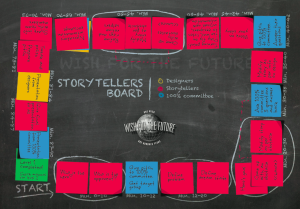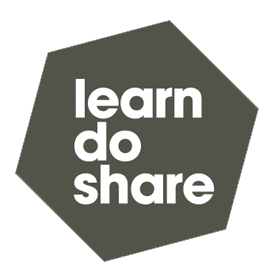At least we think it’s the first.
Imagine a neighbourhood being collectively evicted. Councils have tried and failed to come up with a solution that alleviates gentrification; urban planners have given up, other authorities shun responsibility. What if the answer can be found in a simple game that can be applied to any problem? A fun game that can be downloaded and printed at home, a collaborative game that ignites the greatest power we all have: our imaginence (imagination + intelligence). Could local solutions created by friends and neighbours trigger landslide change?
 Vivid Ideas in Sydney invited us to play the game with a groups of 19 participants from policy, social housing, and areas such as architecture, filmmaking, arts, media, and social work. They joined us in the ambitious endeavour to co-design solutions to developments issues in Australia’s social housing policy.
Vivid Ideas in Sydney invited us to play the game with a groups of 19 participants from policy, social housing, and areas such as architecture, filmmaking, arts, media, and social work. They joined us in the ambitious endeavour to co-design solutions to developments issues in Australia’s social housing policy.
Inspired by 1-hour prototyping workshops, the game itself works like a handbook that guides players and can be applied to any problem. Combining storytelling, collaboration and game mechanics, the concept uses absurdity to inspire divergent thinking, and applies design principles to ensure realistic outcomes. By also creating a collective narrative that explains the solution, it can be easily explained to outsiders, so the ideas can travel. Results are creative commons and can be shared on a website to increase chances that solutions are implemented widely. We premiered in June 2013 at Vivid Ideas in Sydney.
The game was developed to help neighbourhoods, friends and other communities to come together for a social night to ideate and create around shared concerns. Therefore, the game itself is released under a non-commercial share-alike creative commons license, so you can download, print and play, no pay! (Warning: at the moment the game still needs facilitators, who know a bit about open design. We’re working on it.)
 The concept was created by Ele Jansen and Lance Weiler, both Reboot Stories. Additional game mechanics were designed by Deepti Raavi and Purnima Iyer, Pinaka Interactive. Graphics by Northern Army (wishforthefuture logo) and Monique Coffey (game boards, moniquecoffey.com). The specific session at Vivid was co-created with Jordan Bryon, who works with members of Sydney’s housing communities in a participatory storytelling project called TURF.
The concept was created by Ele Jansen and Lance Weiler, both Reboot Stories. Additional game mechanics were designed by Deepti Raavi and Purnima Iyer, Pinaka Interactive. Graphics by Northern Army (wishforthefuture logo) and Monique Coffey (game boards, moniquecoffey.com). The specific session at Vivid was co-created with Jordan Bryon, who works with members of Sydney’s housing communities in a participatory storytelling project called TURF.
How it works
This 90-minute rapid prototyping workshop is a hybrid between an app game, a card game and a board game that brings together design strategies and storytelling.
The premise is a wicked problem, ideally suggested by local social housing residents. We invite 1/3 stakeholders and 2/3 interested experts and lay people from economy, government and education. Together the group of maximum 18 strategizes a solution. The execution depends on the group of stakeholders that builds throughout the game.
Drawing on technology, game mechanics and experience design, the workshop differs from traditional design thinking approaches;
- Three facilitators take the participants on a Hero’s Journey. They will encounter self-doubt, challenges, and opposition, blended with strategic stepping stones to start absurd and end on a pragmatic position.
- There are 3 groups; the future sends cryptic messages from a dystopian future, the storytellers are in the present and rewrite history together with the designers who prototype a solution to turn dystopian into utopia;
- To present a result, the design is of the solution is embedded in the story with it’s goal, strategy, resources and timeframe.
- On top of delivering a model that can be executed, this session has proven to ignite tons of fun.
Audience
People interested in collaboration skills, transmedia producers, janitors, architects, painters, policy makers, creative technologists, designers, engineers, urban developers, landscapers, public housing residents. It takes a 100% to build sustainably.
Takeaways
– a solution to a local problem and a new path to find solutions together
– participants experience what agility and collaboration means in today’s global culture industry
– we test and refine storytelling as way to transfer knowledge, create empathy for content and call to action
– we R&D a system to evaluate and improve co-design methodologies using collaboration, game mechanics and story.
References
For references on earlier iterations of the design see
– article on diy days
– Learn Do Share #2
– UTS u.lab’s book #3 “Crowd-Share Innovation
This game is part of Reboot Stories’ www.wishforthefuture.com and will be available on the site once it is ready to be played without a facilitator.
Download Game set: WishForTheFuture_Open Design Game_A Reboot Stories prototype
